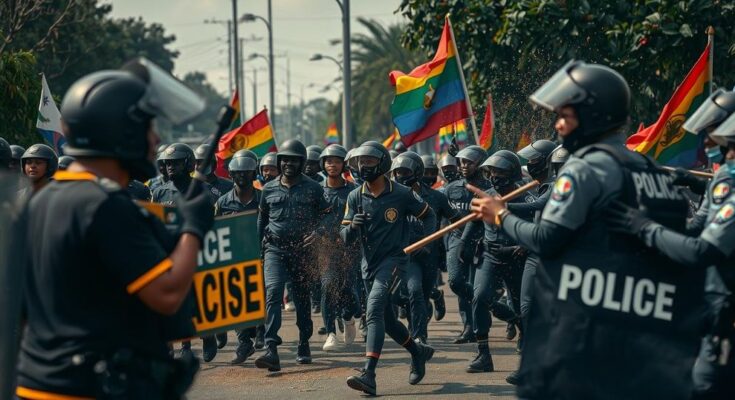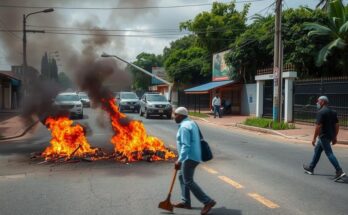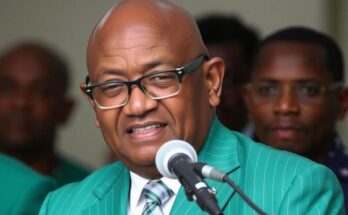Police in Mozambique’s capital of Maputo used tear gas to disperse a protest against alleged electoral fraud just days after the shooting deaths of two opposition associates. Opposition leader Venancio Mondlane urged a general strike in response to early election results favoring the ruling party. The unrest has provoked international condemnation and raised concerns over the legitimacy of the recent elections.
In Maputo, Mozambique’s capital, police deployed riot gear and employed tear gas to disperse a protest organized by opposition members in response to alleged electoral fraud following the October 9 elections. The demonstration was intensified by the recent shooting deaths of two associates of opposition leader Venancio Mondlane, raising tensions in the city. As police advanced down a major thoroughfare, hundreds of demonstrators, including journalists, fled the scene. Reports indicated that some officers discharged firearms during the dispersal. Adriano Nuvunga, director of Mozambique’s Centre for Democracy and Human Rights, noted that two journalists and a security guard sustained injuries, though none were life-threatening. Mondlane, who has been vocal regarding the preliminary election results that favor the ruling Frelimo party, had called for a general strike in a bid to challenge these results. This prompted widespread business closures in Maputo, where helicopters circled overhead while security forces maintained a strong presence. “This morning I couldn’t get out of my house. I had people at my doorstep, including the police. It took me an hour to get out,” Mondlane stated after evading police attempts to prevent his attendance at the protest. The unrest can be traced to the murders of Elvino Dias, a lawyer, and Paulo Guambe, a candidate from the supporting Podemos party, who were both shot while in a car, as confirmed by witnesses. The authorities have launched an investigation into the incident, but the identities of the victims were not initially acknowledged by police. International bodies, including the European Union and the United Nations, have condemned the violence, urging Mozambican leaders and citizens to remain calm and for the perpetrators to be brought to justice. UN Secretary-General Antonio Guterres emphasized the necessity for restraint and the avoidance of violence. Historically, this escalated conflict follows a pattern of violence associated with Frelimo, which has remained in power since Mozambique achieved independence nearly five decades ago. Observers noted that the recent elections have not fulfilled international democratic standards, citing issues such as vote buying and intimidation, which undermine the legitimacy of the electoral process. As President Filipe Nyusi prepares to step down after two terms, Daniel Chapo is anticipated to succeed him as the party’s candidate. Mondlane has asserted victory in the purportedly successful strike, which he claims effectively paralyzed 95 percent of public and private services across Mozambique.
Mozambique, a nation of approximately 33 million, has been grappling with political turbulence surrounding its electoral process. The recent presidential and parliamentary elections have been marred by accusations of fraud, intimidation, and violence—particularly aimed at opposition leaders and their supporters. The ongoing unrest following the recent elections underscores the contentious political climate in the country, with opposition figures calling for protests against perceived electoral misconduct. This backdrop of violence and attempts to suppress dissent highlight the fragile state of Mozambique’s democracy. The killings of Mondlane’s associates serve as a stark reminder of the potential consequences faced by those opposing the ruling party, Frelimo, which has held power since independence.
In conclusion, the recent protests in Mozambique have underscored a deeper conflict between the ruling party and opposition figures advocating for electoral integrity. The violent response from law enforcement, compounded by recent tragic events, emphasizes the critical need for calm and accountability. International observers and organizations have called for restraint and have criticized the electoral process, which raises significant questions about the nation’s democratic health. As the political situation continues to evolve, the calls for justice and democratic reform remain more pressing than ever.
Original Source: www.aljazeera.com




